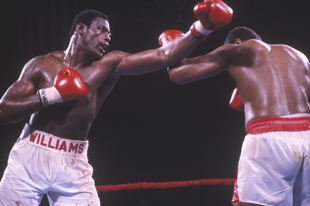Born Henry Jackson on Dec. 12, 1912, in Columbus, Miss., he was the 11th of 15 children. His father, also called Henry, was a mix of Indian, Irish and black blood. His mama, America, was half-Cherokee Indian. When Armstrong was 4, the family moved to St. His mother died a year later, and he was raised by his grandparent. As a lad, he got into neighborhood street fights. But there was a tender side, too, as he showed at his high school graduation when he read an original poem.
As an amateur Armstrong fought under the name of Melody Jackson. He quit his job working for the Missouri-Pacific Railroad, figuring he could make his riches fighting for pay. His debut as an 18-year-old pro was unfavorable, as he was knocked out in the third round by Al Iovino on July 27, 1931, in Pennsylvania. It was one of only two knockouts Armstrong would experience in his career. His next contest was four days later, and he won a six-round decision.
Armstrong moved to Los Angeles, where he resumed his amateur state. He teamed up with -- and took the last name of -- a coach and former boxer called Henry Armstrong. He officially turned pro a year later after failure to make the 1932 Olympic team, and he lost his first two fights, both four-round decisions in Los Angeles in 1932. Boxing as a featherweight, he gained quite a morsel of experience from 1933 to 1935, fighting 46 times, mostly in California and Mexico.
But 1938 was an even better year for Armstrong, as he took the two more championships. Although Armstrong was outweighed by at least 15 pounds by Ross, he dominated their fight in Madison Square Garden, pounding the champion unmercifully for 11 rounds. "I carried him the last four rounds," Armstrong said. "I was asked to do it, and he thanked me.".
Ten weeks later, Armstrong's fight with Ambers was a war. Armstrong knocked down the champ in the fifth and sixth rounds, but Ambers cut him severely. "If you spit any more blood on that floor," referee Billy Cavanaugh told Armstrong, "I'm going to stop this fight.".
They used to say of Henry Armstrong that he never threw a jab or took a backward step in his life. He'd be even money against a moving train. He'd charge a rhinoceros. He made his fight like a guy running for a bus. He walked through people like turnstiles. His manager, Eddie Mead, once summed up his fighting style as "he just kept hitting people till they disappeared." Henry came from a long line of people who suffered in this life, and he never expected anything but more of same.
Armstrong had his cornermen remove his mouthpiece so he could swallow the blood flowing in his mouth the last five rounds. Despite losing three rounds on fouls, having both eyes cut and swollen, and needing 37 stitches later to close the wound inside his mouth, Armstrong won a split decision. He had fulfilled his goal -- he reigned as champion over three divisions.
But not for long. He voluntarily relinquished his featherweight crown, and the next August he lost the lightweight title back to Ambers on a unanimous decision. That fight, before 29,088 fans at Yankee Stadium, was another brawl as the fighters pounded each other for 15 rounds. Armstrong was penalized five rounds for low punches, and that cost him the fight as two officials had Ambers winning by only an 8-7 margin.
After the decision was announced, the second fight started; both managers and the New York State Athletic Commission were the participants. Mead was suspended 13 months after accusing commissioner Bill Brown of favoring Ambers. Al Weill, Ambers' manager, was suspended four months for his unsportsmanlike behavior.
On March 1, 1940, in Los Angeles, Armstrong sought to become the first-ever four-division champion when he attempted to wrest the middleweight crown from Ceferino Garcia, whom he had decisioned in a welterweight defense in 1938. Fighting true to form, Armstrong applied pressure throughout the bout. But Garcia shut the challenger's left eye and gained a draw, enabling him to keep the title.
Seven months later, a fading Armstrong finally lost his welterweight title after the 19 successful defenses, including six in 1940. Fritzie Zivic, a veteran journeyman best known for questionable tactics, worked Armstrong's eyes, which were scarred and vulnerable to cutting, and took a unanimous decision. Armstrong fared even worse in their rematch in 1941, suffering a 12th-round TKO. That was the last time Armstrong would fight for a championship.
After taking 16 months off, he came back and stayed around until 1945, fighting 49 times although he had lost most of his skill. He finally did beat Zivic, by decision in 1942, but Zivic was no longer champ. In 1943, Armstrong lost a 10-round decision to an up-and-coming Sugar Ray Robinson, who had idolized the three-division champion.
He died at age 75 on Oct. After his death, his heart was found to be one-third larger than average. That didn't surprise anybody in boxing. Armstrong, who had been in poor health for nearly a year, died of heart failure early Saturday morning at California Medical Center where he had been brought from his South Central Los Angeles bungalow by paramedics, only 2 days after he had been released from another hospital.
Reference
Articles about Henry Armstrong. (2014). Retrieved on April 27, 2014, from http://articles.latimes.com/keyword/henry-armstrong.
ESPN.com: He was 'Homicide Hank' for a reason. (2014). Retrieved on April 27, 2014, from http://espn.go.com/sportscentury/features/00014077.html.







